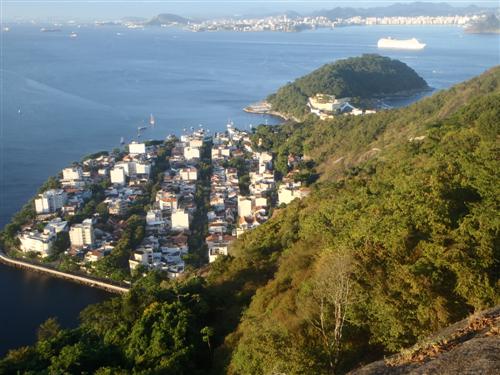After spending a few weeks traveling through Brazil, visiting various cities, interacting with locals, sampling the local foods, and doing some forro dancing, I’ve made a few observations about this wonderful culture and country along the way like:
They Like To Hug
Don’t expect a firm handshake or polite nod when meeting a Brazilian. Most instead will opt for a hug or kiss on the cheek. Even during conversations with strangers, I noticed people have no problem holding your hand or touching your arm. At first, I was a little taken aback with the warm greetings. I guess the confusion showed on my face, as one local girl pointed out, “You look like me the first time I was in the U.S. and someone wanted to shake my hand.”
They’re Extremely Friendly
I don’t mean they simply say hello to you in an elevator. I mean I had complete strangers offering to show me around their home cities, meet their families, and go out to dinner with them. I even became close friends with the Brazilian girl sitting next to me on the plane ride over, who introduced me to her mom, invited me over for dinner, and showed me her favorite beaches.
They’re Not All Skinny
Now, I do not in any way mean this as an insult, but simply a fact. Coming from New York, I imaged being surrounded by millions of Giselle Bundchens and Adriana Limas. I wasn’t the only one, as many of my friends commented on how sexy the population must be. While I did see plenty of beautiful women with perfect bodies, I also saw my fair share of overweight women, as well. I will say, however, these people can pull off a thong bikini better than any other culture.
They’re Respectful
You know those seats on subways that are reserved for the handicapped, pregnant, and elderly? Where I’m from, those signs mean nothing. If you get on and you’re pregnant or handicapped, the person sitting there may get up and give you their seat, but they’re still going to occupy it until someone who needs the seat gets on. Not in Brazil. For the most part, people really don’t sit in these special seating areas unless they really are handicapped, pregnant, or elderly. And, to prove my last point, they even have a special seating area for the obese.
Vinho (Wine) Is Difficult To Find In Bars, But Beer And Caiprihinias Are Plentiful
Anyone who knows me knows my love of wine. Good wine, bad wine, expensive wine, cheap wine, I love it all. While you can buy wine in the grocery store, a lot of the bars I went to didn’t carry it. I was reallly excited in Ilha Grande when I finally found a place that sold it. However, when I went to order a second glass, I was informed that I had drank the last of what they had in stock. Luckily, Brazil is located right next to Argentina, a heaven for winos like myself.
They Don’t All Speak Spanish
While I knew the locals spoke Portuguese before going to Brazil, it’s amazing how hard it is to not speak Spanish. This is mainly because I don’t know any Portuguese and have a working knowledge of Spanish, but I wasn’t the only one who did this. Tons of others tried this tactic, as well, thinking it perfectly normal. It made me curious, so I asked some locals what they thought of foreigners speaking Spanish to them. While some found it annoying, saying things like “I don’t know Spanish, so why do people speak it to me?” others didn’t mind at all, as there are plenty of Brazilians who do know Spanish, as well.
They Eat Candy For Breakfast
Seriously. Candy, cookies, and cakes are a huge part of the Brazilian diet. It was interesting how the hostel breakfasts always seemed to include these foods. At one hostel, a local Brazilain reached into a jar of colorful jellybean-like sweets and pronounced “time to start the day!” I asked one girl if they ever ate eggs -my favorite – for breakfast. “She looked bewildered. “For breakfast? That’s more of a dinner food.”
They Love Acai
When I was told by a local that I must try acai in Brazil, I laughed. I’d drank acai juice plenty of times in bars in New York. Besides, I wanted to spend my time doing cultural things. Turns out, enjoying acai in Brazil is a cultural thing. You’ve really never had acai until you’ve had it in Brazil, as the fruit is cultivated in the north of the country. Moreover, depending on where you live in Brazil, why and how you eat acai will differ. For example, while it is a trendy treat in Rio de Janeiro for athletes to have post-workout as a frozen refresher, in the north it is eaten as a side dish with fish to give laborers energy to work. My favorite was eating it in a bowl with banana slices, honey, and granola.
They Love to Dance
I loved watching the locals partner-dance, all looking like professionals with practiced routines. In Paraty, I was asked to dance by almost every local, girls included. They were all great teachers, and I like to think that by the end of the night I was almost as good as they were (but, probably not). Moreover, they’ll dance anywhere, even in the streets. At the same bar in Paraty, which didn’t really have a dance floor, but was more of a beach bar with an outdoor deck, the street became flooded with couples dancing without a care in the world.
There Isn’t A Big Street Food Scene
Unlike Asia, Africa, and parts of the United States, where street food is a great way to eat delicious food for a cheap price, that doesn’t really exist in Brazil. If you want to save money, some street vendors and small cafes will sell tapioccas – which are kind of like crepes, but with a crunchier outside – and hot pockets of different shapes and sizes. These usually cost about 3-5 Reais (about $1.50-$2.40).
You Probably Won’t Get Murdered In Rio de Janeiro Or Sao Paulo
Before going to Brazil, I heard horror stories of things that were going to happen to me. I would be raped, shot, murdered, and my liver would be cut out and sold on the black market. While I will agree Rio de Janeiro and Sao Paulo are a bit rough, and you need to be careful about showing money or electronics on the streets, I never felt unsafe in either of these cities. Be smart, don’t walk alone at night, and don’t flash your iPhone and wallet around.
Jessica Festa
Latest posts by Jessica Festa (see all)
- A Culturally-Immersive Adventure In Mongolia’s Altai Mountains - Jul 8, 2023
- This Recipe Sharing Platform Supports Women In The Culinary Industry (Labneh Recipe Included!) - Nov 5, 2020
- Hiking The Mohare Danda Community Eco-Trek In Nepal - Jun 3, 2020
- 6 Important Questions For Choosing A Responsible Yoga Retreat - May 18, 2020
- How To Create & Grow A Profitable Blogging Business (Ethically) - Jan 18, 2020









